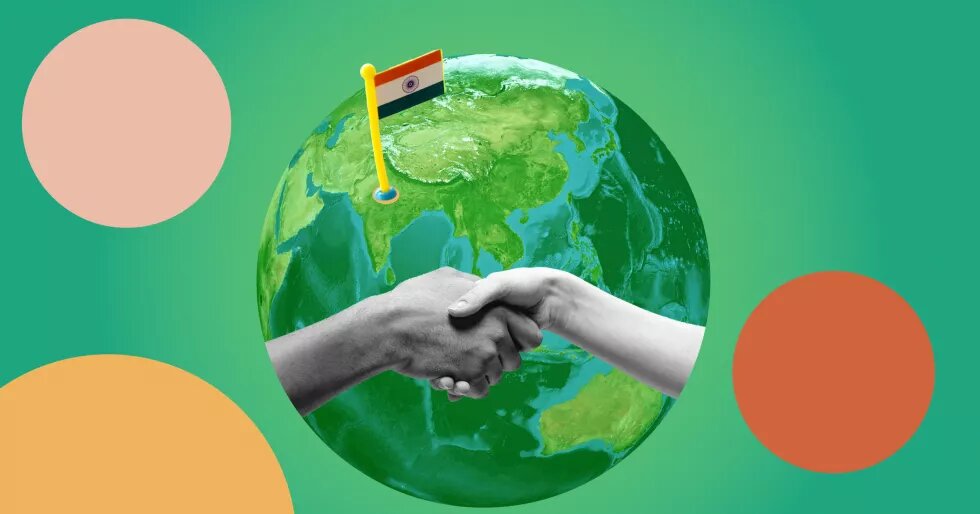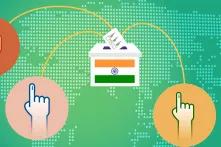The article outlines how India's proactive foreign policy and strategic diplomatic efforts are shaping its national and international political status.

The Indian government scored an important diplomatic win when it secured pardon for eight former Indian naval officers working in Qatar, who had been sentenced to death following allegations of espionage. With the country at the time readying for the general elections, which began on 19 April 2024, and foreign policy now high on the agenda, the rescue, effected on February 12, earned India’s Prime Minister, Narendra Modi, heart-felt gratitude from those brought back home. “Without the intervention of Prime Minister Modi, we wouldn’t have been standing here,” one of the officers told the media.1 The two-term leader since 2014 and the Prime Minister-elect of the Bharatiya Janata Party (BJP) in 2024 was limned as a master strategist, leveraging the goodwill earned under the international spotlight, to make political gains at home.
The timing of these achievements—just prior to the country going to the polls—calls to mind the 2019 elections when also Modi had cleverly displayed his statesmanship, calling for air strikes on alleged terrorist training camps in Pakistan as a response to an attack on an Indian army base. In an election that was being touted to hit the BJP’s seat share, such actions helped2 to flip the mood of the nation: the BJP won that election with an even higher vote share than earlier.
India’s push towards recognition as a global power
Historically3, foreign policy has not been an avowed poll plank for political parties in India, but this has changed over the last five years, the trend culminating in the hosting by New Delhi of the 2023 G20 summit, a first for India. The Indian government has been making a tremendous push towards securing the country’s position as a ‘Vishwamitra’ (literally meaning “friend of the world” and in Hindu mythology, a sage known for both hauteur and compassion). From Modi’s first state visit to the United States on a White House invitation in June 2023 to the successful landing of the Chandrayaan-3 spacecraft on the moon in August of the same year, India has had a year of hyper-visibility internationally. Even prior to that, when Covid-19 struck, Modi was able to position the country as an important pharmaceutical manufacturing centre and leader of the Global South, providing vaccines to countries in Africa—and also North America.
Overall, India’s cautionary approach has changed to one of articulating its interests, as said by its External Affairs Minister, Subrahmanyam Jaishankar during an interaction in 2020..4 With neighbouring China undeterred in its ‘expansionist’ ambitions—in Asia, Africa and Eastern Europe—Jaishankar added that India could no longer be a bystander, but needed to be a contributor, weighing in on matters such as rules for connectivity, maritime security, terrorism and climate change.
India’s strategic importance to the Western bloc as an ally against China’s rising dominance has enhanced its suitability as a manufacturing hub with a large (and relatively cost-effective) labour force. It has capitalised on this by banning Chinese-made applications such as TikTok (much to the dismay of Indian rural content creators who were minting money on it) and PUBG Mobile.
These maneuvers were also signs of the government sending out a firm message to citizens, showing where its priorities lay as China encroached deeper into Indian territory and also tightened its financial grip over India's neighbours like Sri Lanka, Myanmar and Maldives among many others in the Global South.
New-found self-confidence and authoritarianism
The plaudits at home have come, but with some of India’s global rankings taking a hit. Domestic policies that are perceived to curtail press freedoms, target minorities and shrink the independence of state institutions have come under scrutiny by the Western media and international civil society watchdogs. Specifically, India has fared very poorly on global freedom indexes such as Freedom House's5 annual study that rates India as ‘partly free’ and the World Press Freedom Index where India’s ranking has slipped to 161—below Taliban-ruled Afghanistan.
The government openly dismisses the legitimacy of these rankings and has now decided to facilitate democracy surveys, this time conducted by Indian think tanks.
This is a mark of the government’s authoritative style, which has had democracy being often described as ‘backsliding’6 but conversely, has bolstered its popularity at home. Modi even tops global popularity rankings of heads of state. Pew Research Center’s Spring 2023 Global Attitudes Survey found that 85% of respondents in India said that military rule or rule by an authoritarian leader would be good for the country. Also, numbers in India in favour of military rule or an authoritarian leader were the highest among the 24 countries surveyed while those who said that it is important for opposition parties to operate freely were the third lowest. Meanwhile, the percentage of Indians who believed that representative democracy is a good form of governance declined considerably vis-à-vis 2017, when the same survey was conducted.
These sentiments help explain India’s clear pushback on occasions when it has been criticised by largely the West for compromising on democratic values and civil liberties. In July 2023, it responded to a reproachful European Parliament resolution, condemning the violence in Manipur, by saying it was ‘unacceptable’ and reflected ‘a colonial mindset’. Similarly, India has independently maintained its diplomatic and trade relations with Russia despite receiving opposition from its Western partners after the Russian war on Ukraine.
In 2023, India turned around accusations by Canadian Prime Minister Justin Trudeau of having had a hand in the assassination of pro-Khalistani activist, Hardeep Singh Nijjar, in June 2023 outside his gurudwara in Surrey, Canada. It instead accused Canada of sheltering Khalistani extremists and terrorists who threaten its sovereignty and territorial integrity, and urged the government to take prompt action against all ‘anti-India elements’. The more recent allegations of India’s hand in the attempted assassination of a Sikh activist, who was put on India’s terror list in 2020, has spruced up India’s authoritative image among domestic voters.
India’s position on Palestine - from being one of the first countries to give it a formal recognition in 1950 - has also evolved for the sake of weapons trade and ideological ties with Israel. India supported Israel’s invasion of Gaza as its right to defend itself against the October 7 attacks by Hamas. While it continues to push for the two state solution and has voted in favour of the United Nations Security Council resolution for ceasefire7, it has been exceptionally cordial towards Israel, even abstaining from voting against the war in the beginning.8
For the domicile voter, India's resilience to practice its politics of nationalism and also ease of business diplomacy with countries like Russia and Myanmar has shown that it can hold its own among global superpowers.
India has successfully justified these decisions--serving both national and geo-political interests—to its voters through a pliant mainstream media, state owned media and wide social media outreach. With only select journalists, Bollywood actors, and now, content creators, having access to lawmakers, including Modi, the government has avoided addressing questions on unemployment and inflation. The last ten years have also seen an increasing silencing of independent journalists and government critics, many of whom have been jailed on questionable charges. In February 2024, the longest serving foreign correspondent in India, a French national, was forced to leave after her work permit was cancelled.
Beyond soft diplomacy
Such steps suggest that beneath the Vishwamitra persona lie the more hardline dreams of Hindu strongmen to make ‘Bharat’ (India) not only a Hindu nation, but a ‘Vishwaguru’, a global advisor. The BJP government caused a stir among its South Asian neighbours in May 2023 when the newly unveiled parliament building featured a mural of Akhand Bharat (undivided India), which included Bangladesh, Nepal, Sri Lanka, Afghanistan, Pakistan, Bhutan, Myanmar and Tibet, a long-held belief of the party’s Hindu ideological parent, the Rashtriya Swayamsevak Sangh (RSS).
While the parliament building is new, the Hindu nationalist party's aspirations are not: they were always global and resonate strongly with the Indian diaspora. Less than a month after inaugurating the Ram temple on the disputed site of a mosque in India in January 2024, Modi inaugurated the first Hindu temple in the Middle East: over 3.5 million Indian expats live in the United Arab Emirates (UAE) alone.9 This move was seen as an effort to further cement trade relations and cultural exchange between the two nations.
The announcement of the pardon of the naval officers also coincided roughly with a trip by the Prime Minister to the UAE in February when a US$78 billion-agreement was also finalized—after protracted negotiations—whereby India will import liquefied natural gas (LNG) from Qatar for an additional 20 years until 2048 at lower than current rates. Humanitarian outreach along with trade deals struck side by side came in useful in that instance, giving India’s soft-power diplomacy a determined edge.
Modi's efforts to promote India's cultural heritage on a global scale through yoga, temple construction and showcasing the wealth of its elite, like the grand pre-wedding of industrialist son Anant Ambani10, is helping him build a stronger connection with the Hindu majority both at home and abroad. His interactions with world leaders in Hindi and his cultural ambassadorship have further added to his popularity among the masses, which is of importance at a time of the ongoing elections.
Disclaimer:
This article was prepared with the support of the Heinrich Böll Stiftung. The views and analysis contained in the publication are those of the author and do not necessarily represent the views of the foundation. Heinrich Böll Stiftung will be excluded from any liability claims against copyright breaches, graphics, photographs/images, sound document and texts used in this publication. The author is solely responsible for the correctness, completeness and for the quality of information provided.
Footnotes
- 1
Times Now, February 12 https://www.youtube.com/watch?v=8-P0N0_uWb0
- 2
Indian Elections 2019: Why the BJP Won Big by Ronojoy Sen; Institute of South Asian Studies NUS https://www.isas.nus.edu.sg/papers/indian-elections-2019-why-the-bjp-wo…
- 3
Foreign Policy and Electoral Politics in India: Inconsequential Connection by Partha S. Ghosh; Asian Survey Vol. 34, No. 9 (Sep., 1994), pp. 807-817 (11 pages)
- 4
Times of India, July 21, 2020 https://timesofindia.indiatimes.com/india/era-of-great-caution-in-foreign-policy-is-behind-us-jaishankar/articleshow/77075012.cms
- 5
Freedom in the World, India: Freedom House https://freedomhouse.org/country/india/freedom-world/2024
- 6
Democracy Index 2023, Economic Intelligence Unit https://www.eiu.com/n/campaigns/democracy-index-2023/
- 7
We are committed to supporting a two-state solution: India on Israel-Palestine conflict; The Hindu, April 09, 2024 https://www.thehindu.com/news/international/we-are-committed-to-supporting-a-two-state-solution-india-on-israel-palestine-conflict/article68045463.ece
- 8
India abstains from UN resolution calling for ‘humanitarian truce’ between Israel, Hamas; Scroll, October 28, 2023 https://scroll.in/latest/1058247/india-abstains-from-un-resolution-for-humanitarian-truce-between-israel-hamas
- 9
Indian population in UAE crosses 3.5 million, minister says; The National News, August 13, 2023 https://www.thenationalnews.com/uae/government/2023/08/13/indian-population-in-uae-crosses-35-million-minister-says/
- 10
The Ambani Gala Expands the Limits of the Big Fat Indian Wedding; New Lines Magazine, March 15 2024 https://newlinesmag.com/spotlight/the-ambani-gala-expands-the-limits-of-the-big-fat-indian-wedding/


